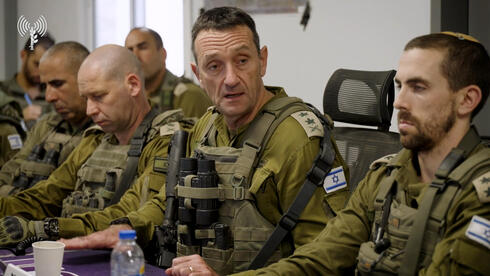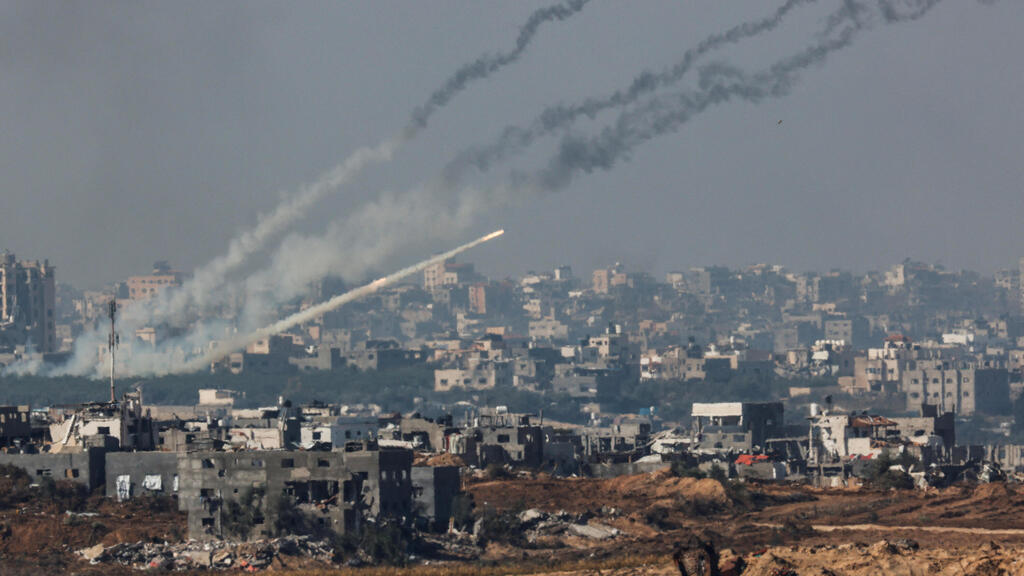NepalIsrael.com auto goggle feed
On the night before the October 7 Hamas massacre, an IDF intelligence unit collected signs of preparation for rocket fire on Israel. The unit also observed unusual activity of the Hamas aerial force that could indicate a transition of the terror group, to emergency mode, Ynet and its sister publication Yeditoth Ahronot learned.
Those indications, especially the possible rocket fire and others gathered, were discussed in IDF consultations in the following hours but did not bring about a decision to raise the alarm over a possible Hamas assault or to any significant steps being taken.
This information was included in documents reviewed by senior government and security officials and presented in their arguments for the resignation of Chief of Staff Herzi Halevi.
3 View gallery


Chief of Staff Herzi Halevi with Southern Command chief Yaron Finkelman and other senior officers
(Photo: IDF)
Contrary to earlier reporting, the IDF not only estimated that Hamas was preparing for a military exercise or to defend against a possible Israeli attack but had seriously considered the possibility that the terror group was about to launch an assault on Israel.
Despite that, the IDF decided on a limited number of actions. Amid calming indications and a wide consensus across the military and intelligence, the IDF opted to avoid exposing sensitive intelligence sources rather than preparedness. These revelations expose a central and dramatic aspect of that night. A participant in recent consultations on the matter defined them “a nuclear bomb.”
Since the massacre, other indications that the intelligence had, came to light including the use of Israeli SIM cards and the deployment of emergency assets in the Strip, used during the 2021 conflict two years earlier. But the preparation to launch a rocket attack, “were a worrying sign on its own, and more so when it is added to other concerning indications.”
The military is continuing its review and inquiries into the failings on that night. A person present in conversations about those inquiring said an senior officer had asked why there were no steps taken to prepare for a rocket attack, including moving the thousands of people from the Nova music festival grounds near the border where there were not enough shelters to protect against a rocket and mortar strike?
Nova party goers seek shelter from rockets in Hamas massacre
There is also a question of whether instructions that were given, such as launching an intelligence flight over Gaza, were carried out?
At 2 am, the Air Force duty command center was notified about the unusual activity in the Hamas aerial units. At the same time more indications of preparations for a rocket strike were received.
All of that information was discussed in a call that Yaron Finkelman, the chief of the Southern Command held with other senior officers, Shin Bet representatives and a representative of the Air Force. Their evaluation written in simple terms read “unusual activity was identified.” Finkelman said there were three possibilities, the third being an assault.
IDF prioritizes protecting intelligence sources
As Ynet reported last Novermber, Finkelman gave a serious of orders but all were to be carried out while protecting sources and were to prevent Hamas from realizing Israel was aware of its unusual activities and to avoid “miscalculations.”
An official close to the government said the Southern Command was aware of the Nova festival and had given the organizers the license for it. “If the information, not about the assault but about possible rocket fire, not meet the standard to stop the party, what would have?”
“Protecting sources was prioritized,” said a senior officer, to explain the gap between the general consensus that there was low probability of an assault and the indications in the report. “If someone would have thought that there was really a danger, preventing it would have been prioritized over any of the intelligence sources and that is why a limited group was involved in the discussions.” Missing from them were the chief of military intelligence and the Commander of the Air Force.
Summary of the Southern Command’s consultations was delivered to Chief of IDF operations General Oded Basyuk who conducted a number of telephone calls. “After consulting the deputy head of Shin Bet, commander of the Southern Command, operations commander and intelligence research department chief, there are three possible scenarios,” he wrote. “A Hamas drill, increased preparedness to defend against an Israeli attack, preparations for an operation against Israel in the coming hours including incursion from the sea or a strike on the gas rig, breeching the border, abduction, shooting attack, rocket attack and an incursion from the air.”
3 View gallery


Memorial service for the victims of the Nova festival goers murdered in the Hamas massacre
(Photo: Gadi Kabalo)
He ordered a number of actions including a review of Israel’s aerial defenses around the gas rig but although he understood that there was a risk of a rocket strike, abduction or “an unusual terror attack, the conclusion was that there must be careful preparation to protect sensitive sources and coordinate actions with military intelligence.” (Later review showed that the Intelligence forces’ operational brigade was not tapped about the possible deployment of forces along the border in the overnight hours and there is an ongoing debate about the responsibility for that.)
The chief of staff who held consultations with Basyuk and Finkelman at 4 am, ordered an aerial intelligence flight and said that if Hamas was conducting a drill, this would be an opportunity to gather information. Despite all of the information that was gathered, Item 8 in the summary said that barring significant developments, further consultations will be held in the morning. His office summoned some senior commanders for 8.30 am.
The IDF said in response to this report that the details in it are not from the official IDF probe. “The IDF will complete its inquiries into the Oct. 7 massacre in the coming weeks and will present their findings to the public.”
The post”Despite IDF warning of rocket strike, Nova party not shut down, new inform” is auto generated by Nepalisrael.com’s Auto feed for the information purpose. [/gpt3]







